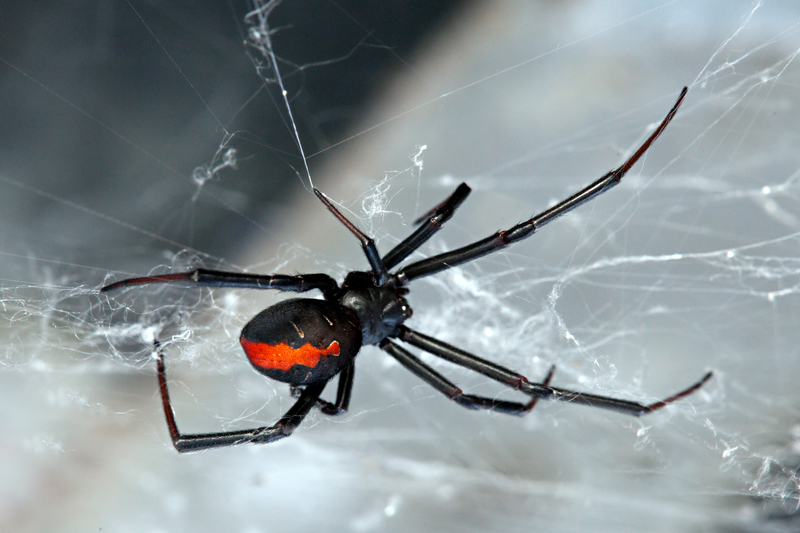Most spiders have a “live and let live” attitude towards anything they do not consider food.
Provoked, however, they will not hesitate to bite and how you treat that can make all the difference in the world.
Black Widow Spiders
Like most spiders, black widows prefers to live outside, but are often found near garages or sheds. Stacks of firewood are also prime real estate for black widows which is one way they can be transferred inside of a home.
The good news about black widows is that they are relatively easy to identify based off their jet-black bodies and distinctive, red hourglass markings.
The bad news is that black widow bites are incredibly painful. There’s no way you won’t notice being bitten by one of these spiders.
In addition to pain, other symptoms include cramping, itching, nausea, vomiting, and in some cases respiratory issues.
Brown Recluse Spiders
In North America, the brown recluse is about as infamous as the black widow.
And similar to the widow, the brown recluse also has a unique identifying mark – this one in the shape of a violin on its head. They also only have six eyes instead of the usual eight. (But I hope you’re never close enough to count!)
Like other spiders on this list, the recluse only bites in self-defense. However, when they venture inside homes, they like to hide in areas where they are likely to be disturbed such as the inside of shoes.
How to Survive a Spider Bite
It’s preferable to seek professional medical treatment after being bitten by a dangerous spider, but that’s not always possible.
If you can’t make it to the hospital, the following steps can help you relieve the pain and discomfort of a spider bite.
• Clean the area with soap and water (Note: brown recluse bites are an exception to this rule and should be kept dry).
• If possible, elevate the area that was bitten.
• Use a cold compress on the bite without applying too much pressure.
• Avoid excess activity.
• Use aspirin or an antihistamine to reduce pain and swelling.
• Pay close attention to the bite as it heals to make sure it does not become infected.Tips for Preventing Spider Bites
One of the best things you can do is keep your house clean and uncluttered.
This will not only cut down on the number of nooks and crannies where a spider can set up shop, but it’ll also cut down on the amount of other insects in your house, which means there won’t be much food for spiders.
When cleaning up areas that are attractive to spiders (like woodpiles), wear protective clothing and gloves to decrease the likelihood of a bite.
There are also a number of natural and chemical free spider repellents that you can make yourself.
Another place to look out for spiders and other bugs is in your car.
For the most part, spiders will try and avoid you as much as you try and avoid them.
If you get too close, though, most will defend themselves and if the spider is poisonous, that can mean a painful and dangerous bite!
To learn more about the types of spiders to look out for and how to treat spider bites, check out the Frog Blog.

Red Back spider. Australian. Care required.
Related to American Black Widow